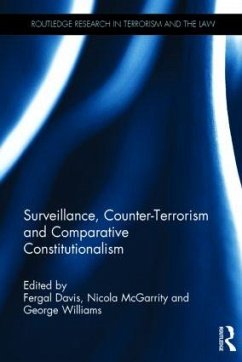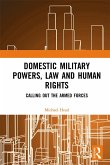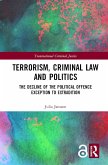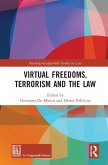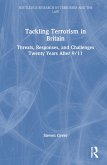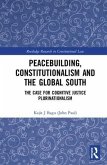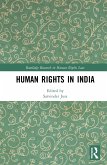Surveillance, Counter-Terrorism and Comparative Constitutionalism
Herausgeber: Davis, Fergal; Williams, George; McGarrity, Nicola
Surveillance, Counter-Terrorism and Comparative Constitutionalism
Herausgeber: Davis, Fergal; Williams, George; McGarrity, Nicola
- Gebundenes Buch
- Merkliste
- Auf die Merkliste
- Bewerten Bewerten
- Teilen
- Produkt teilen
- Produkterinnerung
- Produkterinnerung
This book examines the constitutional implications, short- and long-term, domestic and international, of the expansion of surveillance powers after 9/11. The contributors who are leading international experts in anti-terrorism and constitutional law take a comparative approach looking at jurisdictions including the United States, Canada, United Kingdom, Europe, Israel, India, Japan, China and Australia, and considers the profound effects of mass surveillance on constitutionalism and the rule of law.
Andere Kunden interessierten sich auch für
![Domestic Military Powers, Law and Human Rights Domestic Military Powers, Law and Human Rights]() Michael HeadDomestic Military Powers, Law and Human Rights179,99 €
Michael HeadDomestic Military Powers, Law and Human Rights179,99 €![Terrorism, Criminal Law and Politics Terrorism, Criminal Law and Politics]() Julia JanssonTerrorism, Criminal Law and Politics179,99 €
Julia JanssonTerrorism, Criminal Law and Politics179,99 €![Virtual Freedoms, Terrorism and the Law Virtual Freedoms, Terrorism and the Law]() Virtual Freedoms, Terrorism and the Law190,99 €
Virtual Freedoms, Terrorism and the Law190,99 €![Tackling Terrorism in Britain Tackling Terrorism in Britain]() Steven GreerTackling Terrorism in Britain190,99 €
Steven GreerTackling Terrorism in Britain190,99 €![Peacebuilding, Constitutionalism and the Global South Peacebuilding, Constitutionalism and the Global South]() Bagu (John Paul) Kajit JPeacebuilding, Constitutionalism and the Global South179,99 €
Bagu (John Paul) Kajit JPeacebuilding, Constitutionalism and the Global South179,99 €![Sedition and the Advocacy of Violence Sedition and the Advocacy of Violence]() Sarah SorialSedition and the Advocacy of Violence179,99 €
Sarah SorialSedition and the Advocacy of Violence179,99 €![Human Rights in India Human Rights in India]() Human Rights in India179,99 €
Human Rights in India179,99 €-
-
-
This book examines the constitutional implications, short- and long-term, domestic and international, of the expansion of surveillance powers after 9/11. The contributors who are leading international experts in anti-terrorism and constitutional law take a comparative approach looking at jurisdictions including the United States, Canada, United Kingdom, Europe, Israel, India, Japan, China and Australia, and considers the profound effects of mass surveillance on constitutionalism and the rule of law.
Produktdetails
- Produktdetails
- Verlag: CRC Press
- Seitenzahl: 360
- Erscheinungstermin: 5. Dezember 2013
- Englisch
- Abmessung: 234mm x 160mm x 25mm
- Gewicht: 635g
- ISBN-13: 9780415829106
- ISBN-10: 0415829100
- Artikelnr.: 38020737
- Verlag: CRC Press
- Seitenzahl: 360
- Erscheinungstermin: 5. Dezember 2013
- Englisch
- Abmessung: 234mm x 160mm x 25mm
- Gewicht: 635g
- ISBN-13: 9780415829106
- ISBN-10: 0415829100
- Artikelnr.: 38020737
Fergal Davis is a Senior Lecturer with the Australian Research Council Laureate Project: Anti-Terrorism Laws and the Democratic Challenge, Gilbert + Tobin Centre of Public Law, University of New South Wales, Sydney, Australia. Nicola McGarrity is a Lecturer with the Australian Research Council Laureate Project: Anti-Terrorism Laws and the Democratic Challenge, Gilbert + Tobin Centre of Public Law, University of New South Wales, Sydney, Australia. George Williams is the Anthony Mason Professor of Law, a Scientia Professor and the Foundation Director of the Gilbert + Tobin Centre of Public Law, University of New South Wales, Sydney, Australia. As an Australian Research Council Laureate Fellow, he is currently engaged in a five year international project entitled: Anti-Terror Laws and the Democratic Challenge.
Part 1: Introduction 1. Mapping the Terrain, Fergal Davis, Nicola McGarrity
and George Williams 2. A Judicial Perspective: Surveillance Evidence and
the Right to a Fair Tria, Anthony Whealy QC Part 2: Who is Watching? 3.
Championing Local Surveillance in Counter-Terrorism, Clive Walker 4.
Surveillance Regimes in Contemporary India, Ujjwal Singh 5. Privatised
Counter-Terrorist Surveillance: Constitutionalism Undermined, Fiona de
Londras 6. How Secure is our Privay in Seceurope? European security through
surveillance, Moica de Boer and Flora Goudappel Part 3: The Challenges of
Technology for the Right to Privacy 7. Preserving Privacy in a Digital Age:
Lesson of comparative constitutionalism, David Cole 8. On the End of
Freedom in Public Spaces: Legal challenges of wide-area and multiple sensor
surveillance systems, Jens Kremer 9. GPS Surveillance and Human Rights
Review: The European Court of Human Rights and the United States Supreme
Court in Comparative Perspective, Federico Fabbrini and Mathias Vermeulen
10. The Impact of Human Rights Law on Measure of Mass Surveillance in the
United Kingdom, Merris Amos Part 4: Surveillance Across Borders 11.
Transatlantic Perspectives on Counter-Terrorism Surveillance: Surveillance,
borders and the culture of legality, Cian Murphy 12. From the West to the
East: Migration of Surveillance Policy Part 5: Surveillance as Intelligence
in the United States 13. Warrantless Wiretrapping in the United States,
Owen Fiss 14. From Convert to Coercive: A new model of surveillance by
intelligence agencies, Nicola McGarrity and George Williams 15. The Use or
Intelligence in Counter-Terrorism Prosecutions and the Role of the
Prosecutor, David Scharia Part 6: The Potential to Change 16. State
Surveillance in an Age of Security, Conor Gearty 17. Politicized
Challenges, De-Politicised Responses: Political monitoring in China's
transitions, Hualing Fu 18. Internet Surveillance and Poluar
Constitutionalism, Vanessa MacDonnell
and George Williams 2. A Judicial Perspective: Surveillance Evidence and
the Right to a Fair Tria, Anthony Whealy QC Part 2: Who is Watching? 3.
Championing Local Surveillance in Counter-Terrorism, Clive Walker 4.
Surveillance Regimes in Contemporary India, Ujjwal Singh 5. Privatised
Counter-Terrorist Surveillance: Constitutionalism Undermined, Fiona de
Londras 6. How Secure is our Privay in Seceurope? European security through
surveillance, Moica de Boer and Flora Goudappel Part 3: The Challenges of
Technology for the Right to Privacy 7. Preserving Privacy in a Digital Age:
Lesson of comparative constitutionalism, David Cole 8. On the End of
Freedom in Public Spaces: Legal challenges of wide-area and multiple sensor
surveillance systems, Jens Kremer 9. GPS Surveillance and Human Rights
Review: The European Court of Human Rights and the United States Supreme
Court in Comparative Perspective, Federico Fabbrini and Mathias Vermeulen
10. The Impact of Human Rights Law on Measure of Mass Surveillance in the
United Kingdom, Merris Amos Part 4: Surveillance Across Borders 11.
Transatlantic Perspectives on Counter-Terrorism Surveillance: Surveillance,
borders and the culture of legality, Cian Murphy 12. From the West to the
East: Migration of Surveillance Policy Part 5: Surveillance as Intelligence
in the United States 13. Warrantless Wiretrapping in the United States,
Owen Fiss 14. From Convert to Coercive: A new model of surveillance by
intelligence agencies, Nicola McGarrity and George Williams 15. The Use or
Intelligence in Counter-Terrorism Prosecutions and the Role of the
Prosecutor, David Scharia Part 6: The Potential to Change 16. State
Surveillance in an Age of Security, Conor Gearty 17. Politicized
Challenges, De-Politicised Responses: Political monitoring in China's
transitions, Hualing Fu 18. Internet Surveillance and Poluar
Constitutionalism, Vanessa MacDonnell
Part 1: Introduction 1. Mapping the Terrain, Fergal Davis, Nicola McGarrity
and George Williams 2. A Judicial Perspective: Surveillance Evidence and
the Right to a Fair Tria, Anthony Whealy QC Part 2: Who is Watching? 3.
Championing Local Surveillance in Counter-Terrorism, Clive Walker 4.
Surveillance Regimes in Contemporary India, Ujjwal Singh 5. Privatised
Counter-Terrorist Surveillance: Constitutionalism Undermined, Fiona de
Londras 6. How Secure is our Privay in Seceurope? European security through
surveillance, Moica de Boer and Flora Goudappel Part 3: The Challenges of
Technology for the Right to Privacy 7. Preserving Privacy in a Digital Age:
Lesson of comparative constitutionalism, David Cole 8. On the End of
Freedom in Public Spaces: Legal challenges of wide-area and multiple sensor
surveillance systems, Jens Kremer 9. GPS Surveillance and Human Rights
Review: The European Court of Human Rights and the United States Supreme
Court in Comparative Perspective, Federico Fabbrini and Mathias Vermeulen
10. The Impact of Human Rights Law on Measure of Mass Surveillance in the
United Kingdom, Merris Amos Part 4: Surveillance Across Borders 11.
Transatlantic Perspectives on Counter-Terrorism Surveillance: Surveillance,
borders and the culture of legality, Cian Murphy 12. From the West to the
East: Migration of Surveillance Policy Part 5: Surveillance as Intelligence
in the United States 13. Warrantless Wiretrapping in the United States,
Owen Fiss 14. From Convert to Coercive: A new model of surveillance by
intelligence agencies, Nicola McGarrity and George Williams 15. The Use or
Intelligence in Counter-Terrorism Prosecutions and the Role of the
Prosecutor, David Scharia Part 6: The Potential to Change 16. State
Surveillance in an Age of Security, Conor Gearty 17. Politicized
Challenges, De-Politicised Responses: Political monitoring in China's
transitions, Hualing Fu 18. Internet Surveillance and Poluar
Constitutionalism, Vanessa MacDonnell
and George Williams 2. A Judicial Perspective: Surveillance Evidence and
the Right to a Fair Tria, Anthony Whealy QC Part 2: Who is Watching? 3.
Championing Local Surveillance in Counter-Terrorism, Clive Walker 4.
Surveillance Regimes in Contemporary India, Ujjwal Singh 5. Privatised
Counter-Terrorist Surveillance: Constitutionalism Undermined, Fiona de
Londras 6. How Secure is our Privay in Seceurope? European security through
surveillance, Moica de Boer and Flora Goudappel Part 3: The Challenges of
Technology for the Right to Privacy 7. Preserving Privacy in a Digital Age:
Lesson of comparative constitutionalism, David Cole 8. On the End of
Freedom in Public Spaces: Legal challenges of wide-area and multiple sensor
surveillance systems, Jens Kremer 9. GPS Surveillance and Human Rights
Review: The European Court of Human Rights and the United States Supreme
Court in Comparative Perspective, Federico Fabbrini and Mathias Vermeulen
10. The Impact of Human Rights Law on Measure of Mass Surveillance in the
United Kingdom, Merris Amos Part 4: Surveillance Across Borders 11.
Transatlantic Perspectives on Counter-Terrorism Surveillance: Surveillance,
borders and the culture of legality, Cian Murphy 12. From the West to the
East: Migration of Surveillance Policy Part 5: Surveillance as Intelligence
in the United States 13. Warrantless Wiretrapping in the United States,
Owen Fiss 14. From Convert to Coercive: A new model of surveillance by
intelligence agencies, Nicola McGarrity and George Williams 15. The Use or
Intelligence in Counter-Terrorism Prosecutions and the Role of the
Prosecutor, David Scharia Part 6: The Potential to Change 16. State
Surveillance in an Age of Security, Conor Gearty 17. Politicized
Challenges, De-Politicised Responses: Political monitoring in China's
transitions, Hualing Fu 18. Internet Surveillance and Poluar
Constitutionalism, Vanessa MacDonnell

